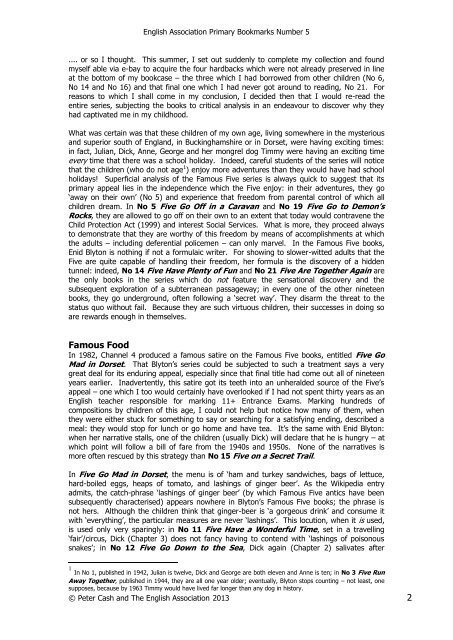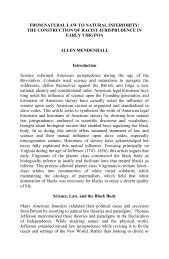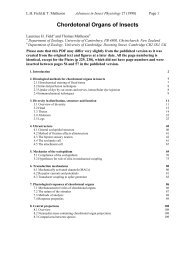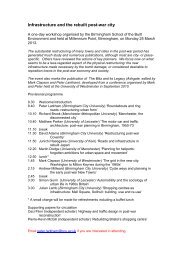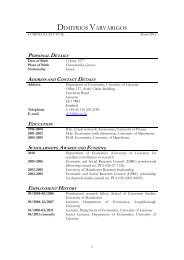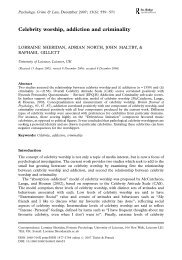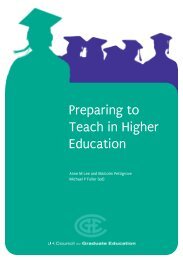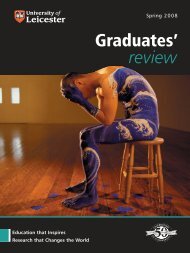Enid Blyton: The Famous Five Books - University of Leicester
Enid Blyton: The Famous Five Books - University of Leicester
Enid Blyton: The Famous Five Books - University of Leicester
You also want an ePaper? Increase the reach of your titles
YUMPU automatically turns print PDFs into web optimized ePapers that Google loves.
English Association Primary Bookmarks Number 5.... or so I thought. This summer, I set out suddenly to complete my collection and foundmyself able via e-bay to acquire the four hardbacks which were not already preserved in lineat the bottom <strong>of</strong> my bookcase – the three which I had borrowed from other children (No 6,No 14 and No 16) and that final one which I had never got around to reading, No 21. Forreasons to which I shall come in my conclusion, I decided then that I would re-read theentire series, subjecting the books to critical analysis in an endeavour to discover why theyhad captivated me in my childhood.What was certain was that these children <strong>of</strong> my own age, living somewhere in the mysteriousand superior south <strong>of</strong> England, in Buckinghamshire or in Dorset, were having exciting times:in fact, Julian, Dick, Anne, George and her mongrel dog Timmy were having an exciting timeevery time that there was a school holiday. Indeed, careful students <strong>of</strong> the series will noticethat the children (who do not age 1 ) enjoy more adventures than they would have had schoolholidays! Superficial analysis <strong>of</strong> the <strong>Famous</strong> <strong>Five</strong> series is always quick to suggest that itsprimary appeal lies in the independence which the <strong>Five</strong> enjoy: in their adventures, they go‘away on their own’ (No 5) and experience that freedom from parental control <strong>of</strong> which allchildren dream. In No 5 <strong>Five</strong> Go Off in a Caravan and No 19 <strong>Five</strong> Go to Demon’sRocks, they are allowed to go <strong>of</strong>f on their own to an extent that today would contravene theChild Protection Act (1999) and interest Social Services. What is more, they proceed alwaysto demonstrate that they are worthy <strong>of</strong> this freedom by means <strong>of</strong> accomplishments at whichthe adults – including deferential policemen – can only marvel. In the <strong>Famous</strong> <strong>Five</strong> books,<strong>Enid</strong> <strong>Blyton</strong> is nothing if not a formulaic writer. For showing to slower-witted adults that the<strong>Five</strong> are quite capable <strong>of</strong> handling their freedom, her formula is the discovery <strong>of</strong> a hiddentunnel: indeed, No 14 <strong>Five</strong> Have Plenty <strong>of</strong> Fun and No 21 <strong>Five</strong> Are Together Again arethe only books in the series which do not feature the sensational discovery and thesubsequent exploration <strong>of</strong> a subterranean passageway; in every one <strong>of</strong> the other nineteenbooks, they go underground, <strong>of</strong>ten following a ‘secret way’. <strong>The</strong>y disarm the threat to thestatus quo without fail. Because they are such virtuous children, their successes in doing soare rewards enough in themselves.<strong>Famous</strong> FoodIn 1982, Channel 4 produced a famous satire on the <strong>Famous</strong> <strong>Five</strong> books, entitled <strong>Five</strong> GoMad in Dorset. That <strong>Blyton</strong>’s series could be subjected to such a treatment says a verygreat deal for its enduring appeal, especially since that final title had come out all <strong>of</strong> nineteenyears earlier. Inadvertently, this satire got its teeth into an unheralded source <strong>of</strong> the <strong>Five</strong>’sappeal – one which I too would certainly have overlooked if I had not spent thirty years as anEnglish teacher responsible for marking 11+ Entrance Exams. Marking hundreds <strong>of</strong>compositions by children <strong>of</strong> this age, I could not help but notice how many <strong>of</strong> them, whenthey were either stuck for something to say or searching for a satisfying ending, described ameal: they would stop for lunch or go home and have tea. It’s the same with <strong>Enid</strong> <strong>Blyton</strong>:when her narrative stalls, one <strong>of</strong> the children (usually Dick) will declare that he is hungry – atwhich point will follow a bill <strong>of</strong> fare from the 1940s and 1950s. None <strong>of</strong> the narratives ismore <strong>of</strong>ten rescued by this strategy than No 15 <strong>Five</strong> on a Secret Trail.In <strong>Five</strong> Go Mad in Dorset, the menu is <strong>of</strong> ‘ham and turkey sandwiches, bags <strong>of</strong> lettuce,hard-boiled eggs, heaps <strong>of</strong> tomato, and lashings <strong>of</strong> ginger beer’. As the Wikipedia entryadmits, the catch-phrase ‘lashings <strong>of</strong> ginger beer’ (by which <strong>Famous</strong> <strong>Five</strong> antics have beensubsequently characterised) appears nowhere in <strong>Blyton</strong>’s <strong>Famous</strong> <strong>Five</strong> books; the phrase isnot hers. Although the children think that ginger-beer is ‘a gorgeous drink’ and consume itwith ‘everything’, the particular measures are never ‘lashings’. This locution, when it is used,is used only very sparingly: in No 11 <strong>Five</strong> Have a Wonderful Time, set in a travelling‘fair’/circus, Dick (Chapter 3) does not fancy having to contend with ‘lashings <strong>of</strong> poisonoussnakes’; in No 12 <strong>Five</strong> Go Down to the Sea, Dick again (Chapter 2) salivates after1 In No 1, published in 1942, Julian is twelve, Dick and George are both eleven and Anne is ten; in No 3 <strong>Five</strong> RunAway Together, published in 1944, they are all one year older; eventually, <strong>Blyton</strong> stops counting – not least, onesupposes, because by 1963 Timmy would have lived far longer than any dog in history.© Peter Cash and <strong>The</strong> English Association 2013 2


